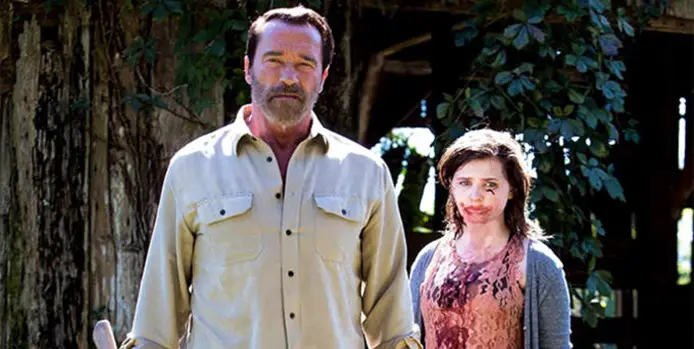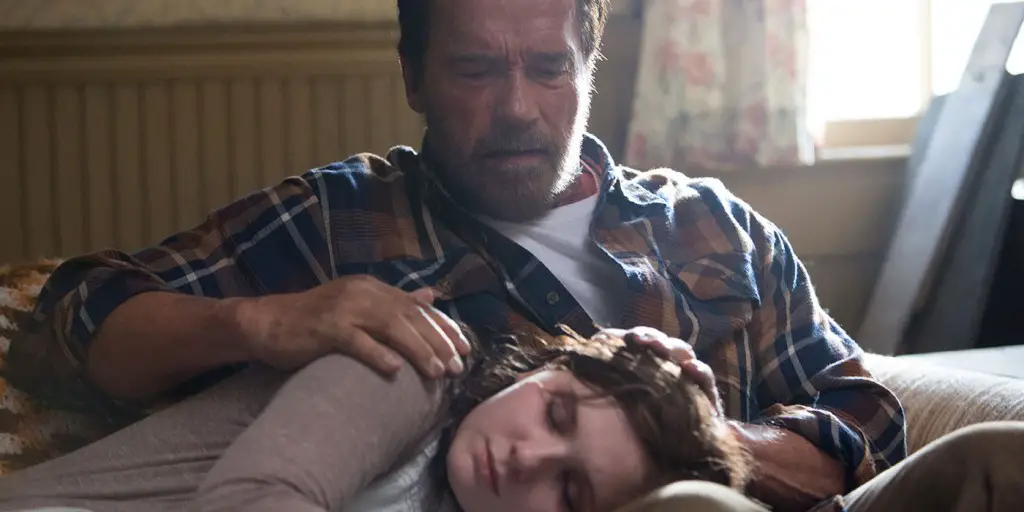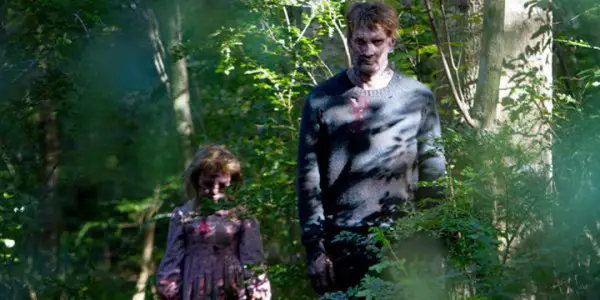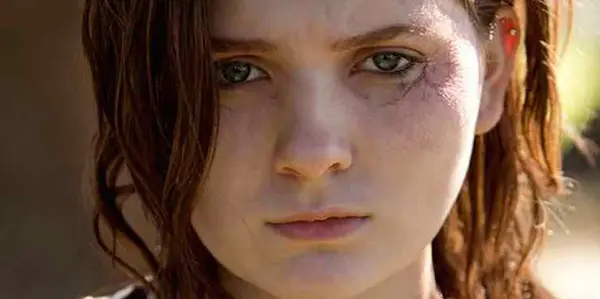MAGGIE: Arnie’s Dramatic Flop

I am a 20-year old who's a huge freak of…
If there is ever a fitting description for Arnold Schwarzenegger’s cinematic persona, then it is this: action film hero. Time and time again, we’ve seen the ex-California Governor’s face adorning several iconic titles, portraying mere mortals (or robots in Terminator’s case) possessing near-superhuman ability, an eye for supersized weapons and a knack for crisp one-liners. Even though there was a small period in the veteran’s long career where he jumped onto the comedy bandwagon, the journey gradually took him back into action territory. So, it is only logical that when you strand him in a post-apocalyptic universe, you would expect another Schwarzenegger-style action-packed flick.
As ironic as this may sound, his latest work Maggie is anything but. Backed up by Schwarzenegger’s personal claim, Maggie is genuinely his maiden departure from the usual action-hero roles. After all, in his current age of 68, he is welcome to lie low, even on the silver screen. It is fair to say, though, that seeing Schwarzenegger in a different light, especially in a dramatic role, will require some patience. Depressively sappy and ploddingly-paced, Maggie is a humanized take on the zombie apocalypse genre that sadly falls as flat as its desolate backdrop.
Marguerite “Maggie” Vogel
While built up as Arnold Schwarzenegger’s drama vehicle, Maggie actually recounts the final moments of its titular character. In this case, it is Schwarzenegger’s character’s daughter Marguerite Vogel (Abigail Breslin), who is given the narrative center stage. Maggie has fallen victim to a widespread outbreak, which has swept across North America and is gradually turning those infected into zombie-like beings. Fortunately, Maggie’s infection is still too mild for her to make such a transformation, or even qualify for quarantine.

However, as she begins to learn the harsh truth, the virtue of time is no longer in her hands. Every shred of humanity left in her slowly gives way as her condition deteriorates. Despite advice from everyone, including her father’s step-wife Caroline (Joely Richardson) to give her up for quarantine, Wade insists on staying by her side through the change. Even if it could potentially put his life on the line once Maggie’s transformation is complete, he risks it all to rekindle the lost love with his daughter while time still permits.
Father-Child Dynamics = Post-Apocalyptic Universe
Starting off as one of the best unproduced screenplays in 2011’s Hollywood Black List roster, there was every indication that John Scott III’s script Maggie was a surefire breath of fresh air to the zombie apocalypse trope. Lionsgate had heavily promoted Maggie as a generic zombie apocalypse flick, while actually such trope would only serve as a mere backdrop in its main narrative. In fact, the script’s broader outline further explores the relationship of a caring father and his sick daughter. As unique as the debutant’s script may be, it hardly adds anything new to either the father-child theme or the post-apocalyptic genre.
With Maggie being humanized take on the zombie apocalypse trope, it could not get any more human than centralizing the narrative on everyday characters like Wade and Maggie. Furthermore, humanizing too is the film’s careful presentation of Maggie’s zombie transformation. Rather than have her zombified quickly and start hunting for brains, the script portrays her transformation similar to that of real-life deadly disease. With that in mind, there are no scenes of any zombies making convulsing sounds nor are there zombies sprinting along pine-covered wood.
Still, for all the realism regarding Maggie’s transformation, the father-daughter chemistry feels a bit too halfhearted. While Wade and Maggie share enough endearing father-daughter moments in the first thirty minutes and the last thirty minutes of the film, the relationship could have been presented in a more consistent manner – the pair should not have been split up in the middle part for a rather needless romance subplot between Maggie and her infected boyfriend Trent (Bryce Romero).
A Uneventful Zombie Apocalypse
In a film that’s about a zombie apocalypse, the least you would expect is to experience the precariousness of such a situation. Since it is Schwarzenegger’s debut in a dramatic role, we already know from the start that there will be no scenes of the gun-slinging Governator blowing zombies’ heads to smithereens. Yet, surely you could expect something more than what Maggie’s post-apocalyptic universe has to offer, as it’s incredibly uneventful.
Although the story focuses more on the father-daughter drama than the zombie apocalypse, still, it would not have hurt to spring up a bit more thrills to give Maggie’s world more life. The film’s beginning was prmising: it started off with a small skirmish between Wade and a pair of fully-transformed zombies at a gas station. Whilst far from being Schwarzenegger’s finest in terms of action stunts, the early thrilling sequence brings promise for more of the same to come.

Sadly, that is the only thrilling moment of note in the film, as Maggie then drifts onward. Some might say it tries to avoid the zombie apocalypse film cliché by sacrificing the blood-and-thunder man v. zombie fight scenes for extensive moments of familial sentimentality. But there comes a point when seeing Maggie or Wade breaking down in tears every time and everywhere that it becomes too aggravating and depressing to endure.
Abigail Breslin’s the only shining light
Of course, when hearing that Maggie is Arnold Schwarzenegger’s departure from his usual action hero roles, we are already curious as to how the Austrian-born actor fares in dramatic roles. The next time he picks up his phone, though, it will most likely be for more action film offers instead of dramatic roles. It’s not as if he did not give his best shot as Maggie’s father, but his performance will probably go down as one of the most unsuccessful genre-shifts in cinematic history. After having become used to seeing him as invulnerable, larger-than-life characters, watching him act all vulnerable and sappy on-screen in Maggie – it’s a mismatch on so many levels.

By comparison, Schwarzenegger’s parade is slightly spoiled by Abigail Breslin’s commanding performance as Maggie. Perhaps the longer screen time the young actress gets compared to Schwarzenegger in the film benefits her character’s development in the narrative. Yet, it is never easy for an actress to simply hold the floor as a handicapped character and try to convince the audience to sympathize with her suffering. Through the favor of some makeup and her own acting chops, Breslin exudes Maggie’s vulnerability, even if that vulnerability gets overly mushy. In the end, in a post-apocalyptic tale with thrills coming at a premium, her side of the story at least manages to evoke some reaction.
Conclusion
Arnold Schwarzenegger and action films are like a match made in heaven. With that in mind, there is nothing his latest work Maggie can do to change that fact. For starters, it sets itself up as a humanized approach to the zombie apocalypse trope, but the move backfired when the more human the film tries to be, the lesser thrills it offers. At least, Abigail Breslin’s commanding performance just shows why she’s better in this genre than her senior Schwarzenegger.
What did you think of Maggie? How did Arnold Schwarzenegger do in his first dramatic role?
(top image source: Lionsgate Films)
Does content like this matter to you?
Become a Member and support film journalism. Unlock access to all of Film Inquiry`s great articles. Join a community of like-minded readers who are passionate about cinema - get access to our private members Network, give back to independent filmmakers, and more.
I am a 20-year old who's a huge freak of movies. I keep myself open to film choices, watching every genre except horror movies. I am currently studying at Petra Christian University majoring in English Creative Industry.













